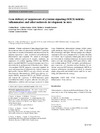Identificador persistente para citar o vincular este elemento:
https://accedacris.ulpgc.es/jspui/handle/10553/75283
| Título: | Gene delivery of suppressors of cytokine signaling (SOCS) inhibits inflammation and atherosclerosis development in mice | Autores/as: | Recio Cruz, Carlota Pilar Oguiza, Ainhoa Mallavia, Beñat Lazaro, Iolanda Ortiz-Muñoz, Guadalupe Lopez-Franco, Oscar Egido, Jesus Gomez-Guerrero, Carmen |
Clasificación UNESCO: | 3207 Patología | Palabras clave: | SOCS JAK STAT Atherosclerosis Inflammation, et al. |
Fecha de publicación: | 2015 | Proyectos: | SAF2012-38830 FIS PI10/00072 |
Publicación seriada: | Basic Research in Cardiology | Resumen: | Chronic activation of Janus kinase/signal transducers and activators of transcription (JAK/STAT) pathway contributes to vascular inflammation and atherosclerosis by inducing expression of genes involved in cell proliferation, differentiation and migration. We aimed to investigate whether enforced expression of negative regulators, the suppressors of cytokine signaling (SOCS1 and SOCS3), inhibits harmful JAK/STAT-mediated responses and affects atherosclerosis in apolipoprotein E knockout mice. Adenovirus-mediated SOCS1 transgene expression impaired the onset and progression of atherosclerosis without impact on lipid profile, whereas SOCS3 was only effective on early atherosclerosis. Mechanistically, SOCS gene delivery, primarily SOCS1, attenuated STAT1 and STAT3 activation and reduced the expression of STAT-dependent genes (chemokine/chemokine receptors, adhesion molecules, pro-inflammatory cytokines and scavenger receptors) in aortic tissue. Furthermore, atherosclerotic plaques exhibit a more stable phenotype characterized by lower lipids, T cells and M1 macrophages and higher M2 macrophages and collagen. Atheroprotection was accompanied by a systemic alteration of T helper- and T regulatory-related genes and a reduced activation state of circulating monocytes. In vascular smooth muscle cells and macrophages, SOCS gene delivery inhibited cytokine-induced STAT activation, pro-inflammatory gene expression, cell migration and proliferation. In conclusion, targeting SOCS proteins, predominantly SOCS1, to suppress pathological mechanisms involved in atheroma plaque progression and destabilization could be an interesting anti-atherosclerotic strategy. | URI: | https://accedacris.ulpgc.es/handle/10553/75283 | ISSN: | 0300-8428 | DOI: | 10.1007/s00395-014-0458-1 | Fuente: | Basic Research in Cardiology [ISSN 0300-8428], v. 110, 8 |
| Colección: | Artículos |
Citas de WEB OF SCIENCETM
Citations
37
actualizado el 22-feb-2026
Visitas
51
actualizado el 10-ene-2026
Descargas
220
actualizado el 10-ene-2026
Google ScholarTM
Verifica
Altmetric
Comparte
Exporta metadatos
Los elementos en ULPGC accedaCRIS están protegidos por derechos de autor con todos los derechos reservados, a menos que se indique lo contrario.
